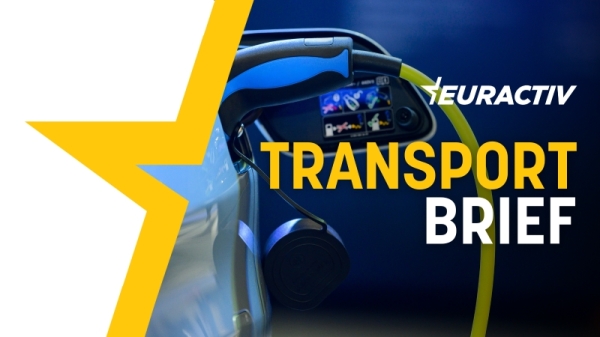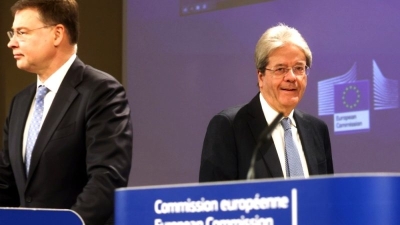Germany loses trust in its future as the world’s automotive leader

Most Germans do not believe their country will be the leading location for car manufacturing in the future, according to a survey conducted by the German Association of Engineers.
Over the past months, news has come to the fore that raises questions about German dominance in the country’s most important branch of industry: car making.
Already in October last year, industry observers were concerned by a deal struck by German rental car company Sixt.
The rental company announced a long-term partnership, not with a German or European manufacturer, but with BYD, a Chinese carmaker. The deal included the purchase of 100,000 electric cars over the next years.
Rental companies are seen as crucial for manufacturers to enter new markets, as they buy large quantities of cars, providing planning certainty for the manufacturer and increasing its visibility on the streets.
Since then, news of Chinese carmakers such as BYD and NIO starting to sell their vehicles in European markets has raised further questions about the future of German manufacturers.
“Chinese cars are flooding Europe,” the headline of Germany’s biggest tabloid, BILD, read last week, citing the quickly increasing market shares of the new suppliers.
At the occasion of the Shanghai motor show in April, it also came to the attention of the German public that among the top ten electric models sold in China, the world’s biggest market for the car industry, none are from a German manufacturer.
The overall market share of German manufacturers in China is still at 19%, but only 5% when it comes to electric cars – which are increasing their share rapidly.
Against this backdrop, it does not seem particularly surprising that the German population has lost trust in the ability of its flagship industry to stay on top of the world.
In a survey conducted by the German Association of Engineers (VDI) and published last Thursday (25 May), 55% of Germans said they do not, or rather not, think that “in 10 or 15 years, the best cars will still come from Germany”.
Only 12% say with certainty that they think so, while 33% say they believe it is likely without being certain.
The Engineers Association called the result “alarming”, warning of a “loss of importance” for German carmakers.
Did Germany too long hope to stick to the old technology of internal combustion engines while ignoring the electric market so that manufacturers can now not hold up to Chinese competitors in this increasingly important segment?
The engineering association does not think so, saying that the acceptance of electric mobility was low among the German population for a long time and that to ensure profit margins, German carmakers have turned to bigger models, leaving the segment of smaller cars to competitors.
“When we talk to individual manufacturers, we see that to earn money, they are increasingly leaving the smallest and small car segment because it no longer makes economic sense,” VDI president Lutz Eckstein said when presenting the survey results.
Therefore, “suppliers from abroad are pushing their way into this market, and Chinese products are right at the forefront,” Eckstein, who also heads the Institute for Automotive Engineering at RWTH Aachen University, added.
This was also due to subsidies which would help Chinese companies to sell their cars on European markets at attractive prices, Eckstein said. “We don’t have a transparent system there,” he criticised.
As a response, policymakers should widen their focus to sustainability in the operation of the cars and their production. This would help German carmakers and those from all countries “that take this issue of sustainability seriously and have transparent processes and supply chains,” Eckstein said.
“This could certainly be an opportunity to be better positioned against this very non-transparent competition,” he said.
However, the engineers also said that while the German public may be right to be sceptical, they might also underestimate Germany’s capacity to innovate, as most innovation would take place behind the scenes.
“We had an intensive and controversial discussion at the point where the prospects of the German automotive industry stand,” said Robert Peters, policy adviser at VDI/VDE Innovation & Technik, who conducted the survey and discussed the results among experts.
“People who work in this industry, we know from comparable studies, have a great sense of pride and are themselves convinced that they can make an important contribution to the revitalisation and further strengthening of this industry,” he added.
Car-industry study provokes skirmish in ‘Euro 7’ war of words
Car manufacturers’ lobby group ACEA made a splash last week with the release of a study on the potential impact of newly proposed emission standards on the cost of vehicles.
The findings were stark. According to the report, the European Commission grossly underestimated the expense of the so-called Euro 7 rules – by a factor of 10 in some cases.
Should the new air pollution standards be foisted on the industry, the purchase price of cars would shoot up, it was concluded.
The manufacturing cost per car would rise by as much as €2,000, while for trucks, the figure is around €12,000. The sticker price for consumers is likely to be considerably higher.
So, how did the Commission get its impact assessment so wrong, you may ask?
According to prominent NGO Transport & Environment (T&E), it didn’t.
The green campaigners’ launched a counter-offensive to the ACEA study on Twitter, accusing the car lobby not so much as crying wolf (a charge made by Energy Cities’ Adrien Hiel, as quoted in EURACTIV) as acting like the truth-fabricating puppet Pinocchio.
“Ignore the scaremongering over the cost of air pollution rules!” the T&E thread began. “ACEA paid a company to survey its own carmakers. Our analysis shows its report has significant biases and omissions and seems to cherrypick data.”
T&E questioned fundamental aspects of the study, such as the timeline used for estimations and whether possible extra costs cited truly stem from Euro 7 rules.
The vigorous NGO response to car industry misgivings over Euro 7 is just the latest in the ongoing war of words over the pollution rules, the last such legislation before the demise of petrol and diesel cars.
Expect the war to intensify as the draft legislation moves to the European Parliament and Council for scrutiny.
The new Brussels bubble night train is here
For those of us who regularly travel between Berlin and Brussels for work, options to do so were previously limited.
While the plane might not be the first choice for climate-conscious travellers, the train connection with a change in Cologne almost takes one workday – with working possible, but limited due to the lack of a stable internet connection.
Since last Thursday (25 May), a new option has emerged: A new, direct night train from Berlin to Brussels via Amsterdam, operated by Dutch Start-Up “European Sleeper”.
The new connection will go from Berlin to Brussels on Sunday, Tuesday and Thursday nights and back from Brussels to Berlin on Monday, Wednesday and Friday.
But will it be a real alternative for business trips for the Brussels bubble? Judging from the maiden voyage, some doubts might be appropriate.
Being in a small compartment at total capacity with five strangers for 11 hours might not sound that desirable.
There is no Wi-Fi on the train, and on the maiden journey, the (already scarce) power sockets did not work in parts of the train, posing a problem – particularly for the group of smartphone-dependent young travellers who made up the main customer group during the first journey.
Nevertheless, ticket prices for such medium-category seats/berths sell at €129, which sounds justifiable if compared to a ticket for a day train or plane plus a stay in an Airbnb or Hotel, but certainly comes with less comfort.
Whether you can sleep on such a train ultimately depends on your personal ability to sleep under difficult conditions – given the constant movement and noises that come with a moving train.
One night of bad sleep might not be a problem for holiday travellers on their way to a camping trip in Sweden or a fun weekend in Rome, but to be an effective lobbyist, public official or journalist, it might be more crucial to sleep tight.
At the end of the day, business travellers who do not want to fly will have to decide between one day of impeded work on a day train or a night of impeded sleep on a night train – hard to imagine who would opt for the latter.

A roundup of the most captivating transport news.
‘Euro 7’ emission rules will drive up car prices, industry says
New EU legislation to rein in vehicle pollution will push up manufacturing costs by €2,000 for cars and €12,000 for trucks and buses, far higher than initial European Commission estimates, a new study backed by car maker association ACEA found.
EU court rules in favour of Ryanair in Italian state aid challenge
Europe’s second-highest court on Wednesday (24 May) backed budget carrier Ryanair’s challenge against Italian state aid, approved by the European Union, for airlines hit by the Covid-19 pandemic, siding again with the Irish airline.
Uber Files: Top official ‘cannot recall’ actioning ‘kill switch’, email proves he did
Uber’s top official Gore-Coty testified at the French ‘Uber Files’ parliamentary investigation committee on Thursday (25 May) that he could not recall personally actioning the data-destruction ‘kill switch’ tool. An email seen by EURACTIV proves he did.
France to open its first electric car battery factory
France will launch its first battery factory for electric cars on Tuesday (30 May), taking a big step in its race to build up a China-dominated sector.
Italy tightens rules on e-scooters in bid to reduce accidents
The Italian government is working on a new highway code to respond to the statistical increase in road accidents, focusing on scooters, announced Italian Infrastructure Minister Matteo Salvini.
Read more with EURACTIV




